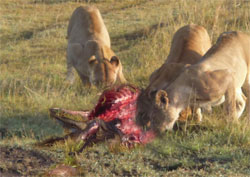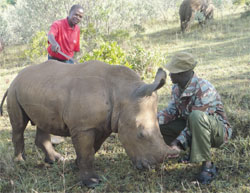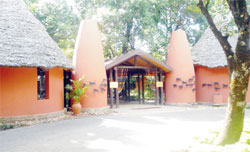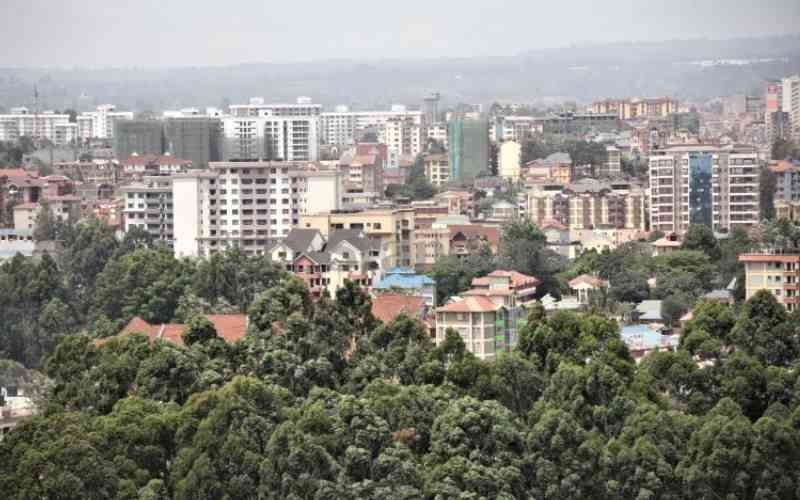By Isaac Ongiri
Scary sounds of groaning hippos keep me awake as I coil on my bed inside tent number 19 in the re-launched Fairmont Mara Safari Club, just a heartbeat away from the renowned Mara River. From a distance, I vividly hear the roaring and the braying of various nocturnal wild species. I manage to fall asleep and shut out the haunting voices of the Mara after midnight.
 |
A pride of lions tears up prey. |
At six o’clock the following morning, my tent attendant knocks reminding me of a scheduled game drive at 6.30am. I contemplate calling off the drive so I can sleep some more but the strong smell of coffee entices me out of bed. But that was only a brief thought.
A few minutes later, Charity and Lillian, my two colleagues and I happily chat away as Jeremiah, the driver, takes us on the game drive. A crackly voice disrupts our chatter. It is from Jeremiah’s walkie talkie.
"Victor 01 reading, we are near Aitong. Hapa iko harusi (there is a wedding here."
Jeremiah translates and informs us that two lions have been spotted mating at Aitong Hill. He accelerates towards the said mountain. We are all hoping to catch some of the action. Moments later, we join scores of tourists at the scene. Everyone is silently enjoying the rare sight and taking tens of photographs and shooting videos.
As if embarrassed by the increasing invasion of their privacy, the two carnivores suddenly walk shyly away into the thicket. Our attempts to go round the bush and spot the amorous lions again bear no fruits. We decide to get on with our drive.
We bump into scavengers who are waiting for a family of lions to make a meal for them and a few other animals basking in the shimmering morning sunrays. Several kilometres from the Fairmount Mara Safari Club, we stop on a hill and join 10 other tour vans that are loaded with tourists eager to catch some fast action. A lioness and her cubs are hunting for a prey.
Tactful lioness
Interestingly, the prey, a herd of black-bearded wildebeest, seem to sense the danger but perhaps fail to sense just how close. With calculated steps, the lioness and her cubs’ advance, keen to make a kill at all costs. Jeremiah explains that the felines are very tactful and almost always succeed in the hunt, otherwise they stay hungry all day long. |
The writer, a game ranger and a baby rhino. Rhinos are responsible for the highest number of human deaths in the jungle. |
As he speaks, the lioness strikes in a flash and the wildebeest take off. A thrilling chase begins and we can feel the adrenaline kick in as the rest of the heard scampers in all directions for safety. Less than a minute later, one of the wildebeest falls down. It has been caught and its life is over. Today, it becomes the meal for the lioness, her cubs and the scavengers.
As she settles to skin her prize, we see the king of the pride slowly walk towards his family. We had not seen him throughout the hunt, he had been so well hidden in the grass. I watch as this lazy lion goes to claim what his partner has killed.
"In the jungle, it is the lioness that is the hunter," Jeremiah explains. "The male just comes along when the prey has been caught."
We can hear the tearing of flesh and the cracking of bones as the lions tear into the wildebeest. We all watch in amazement. A few minutes later, hungry scavengers, including a group of hyenas, gather at the site, albeit at a safe distance. They are all waiting for leftovers.
About an hour later, the family of lions has satisfied their hunger and walk away from the feast. We follow their behinds as they stroll towards the nearby trench to drink water.
As they do so, the scavengers make a mad rush for the remaining carcass but their feasting is stalled when the lions come back to continue with their meal. After a while, the lions go back to the watering hole and, after quenching their thirst, walk away, leaving the scavengers to their feast.
Guaranteed safety
Shortly afterwards, we depart the scene and head to the Rhino Park. My colleagues quickly gather the courage to get close and personal with the rhinos and even touch them. I, on the other hand, I’m a lot more hesitant. I am scared of the beasts. It took the rangers a lot of convincing to get me to finally move in close to the baby Rhino and his mother. A male rhino is kept away because, according to the rangers, it can get wild and aggressive. Rhinos, according to research, are responsible for the highest number of human deaths in the jungle.
 |
Main entrance to the Fairmont Mara Safari Club next to the renowned Mara River. Photos: Courtesy/Standard |
Four hours later, we realise we are hungry and drive back to the lodge for hot showers and breakfast buffet. Afterwards, we take a brief rest and contemplate our next move.
I retreat to my tent from where I get to see all that is happening at the Mara River just before me. Hippos quietly and slowly swim. At night, these mammoth beasts spring to life. The riverbank facing the camp is too steep for the fat herbivores to climb out to graze, which guarantees our safety in the tents. More assurance from lodge manager Munene Ngotho that security is firmly in place for all guests finally consoles me.
Honeymoon tents
"This is the hippo’s breeding point here at the Mara and it is a major attraction to Fairmount Safari Club guests," he says.
Later that day, Ngotho takes us on a tour around the 40-acre facility. Six luxurious deluxe tents were designed with honeymooners in mind. Last year, for instance, a prominent American filmmaker held his wedding at one of these luxurious tents in December. "They came all the way from Europe and we gave them a spectacular wedding ceremony," says Ngotho. "Anyone who wants to have a wedding here can use us to hook them up with local church leaders to officiate the wedding and Maasai elders, depending on one’s request."
Buffet lunch
After our tour of the 51 luxurious tents, all facing the Mara River, we head back for a buffet lunch, which comprises both local and international cuisines. The meal is served at the poolside terrace.
Later, as we relax under the spacious outdoor deck overlooking the river, we are treated to a clear view of crocodiles and hippos playfully chasing one another.
Before we know it, it is time to leave the serene environment and head back in the city. We hurriedly pack our bags and drive to Ngerende Airstrip, which is five-minutes away. At 4pm, our plane jets in and the pilot informs us he has to make four landings to drop and pick guests.
The thought scares me as short landings and takeoffs are normally a nightmare but the pilot assures us there is nothing to worry about.
The scheduled landings are at Serena, Kichwa Tembo and Little Governors. The last drop is the city centre.
Just recalling the day’s adventure was enough to help me overcome the fear of the short flights. This is one escapade I will not forget for a long time.
 The Standard Group Plc is a multi-media organization with investments in media
platforms spanning newspaper print operations, television, radio broadcasting,
digital and online services. The Standard Group is recognized as a leading
multi-media house in Kenya with a key influence in matters of national and
international interest.
The Standard Group Plc is a multi-media organization with investments in media
platforms spanning newspaper print operations, television, radio broadcasting,
digital and online services. The Standard Group is recognized as a leading
multi-media house in Kenya with a key influence in matters of national and
international interest.
 The Standard Group Plc is a multi-media organization with investments in media
platforms spanning newspaper print operations, television, radio broadcasting,
digital and online services. The Standard Group is recognized as a leading
multi-media house in Kenya with a key influence in matters of national and
international interest.
The Standard Group Plc is a multi-media organization with investments in media
platforms spanning newspaper print operations, television, radio broadcasting,
digital and online services. The Standard Group is recognized as a leading
multi-media house in Kenya with a key influence in matters of national and
international interest.












